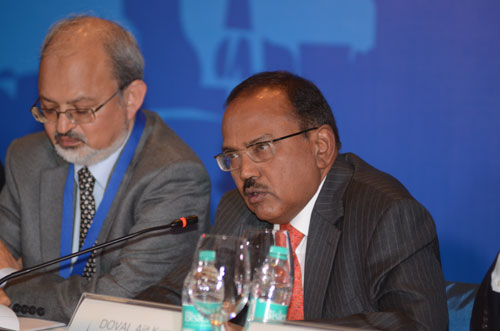|

|
 |
|
Last Updated: Feb 13, 2017 - 1:45:37 AM |

"Democracy is one of the most powerful tools for dealing with security problems" From left to right: Sunjoy Joshi (Director, Observer Research Foundation) and Ajit Kumar Doval (National Security Adviser, Republic of India).
|
INDIA - On October 21/22, the MSC held its 6th MSC Core Group
Meeting, this time in New Delhi in cooperation with the Observer
Research Foundation. The conference in New Delhi focused on security
architecture in Europe and Asia. Questions of maritime security in the
Indo-Pacific, cyber security, as well as challenges of global governance
and the role of emerging powers were also discussed.
India’s National Security Advisor Ajit Doval opened the conference
with a programmatic speech on Indian foreign policy in which he stressed
the importance of democracy and co-operation between democratic states
for global peace and security.
The following international leaders participated in the conference:
-
Anvar Azimov, Ambassador-at-Large of the Russian Foreign Ministry
-
Hans-Peter Bartels, Chairman of the German Bundestag’s Defence Committee
-
Robert Blackwill, former U.S. Ambassador to India and former U.S. Deputy National Security Advisor
-
Joseph M. Cohen, National Security Advisor of Israel
-
Umer Daudzai, Minister of the Interior of Afghanistan
-
Ajit Doval, National Security Advisor, India
-
Markus Ederer, Deputy Foreign Minister of Germany
-
Arvind Gupta, Deputy National Security Advisor, India
-
Ananth Guruswamy, Director of Amnesty International India
-
Jane Harman, Director and CEO of the Woodrow Wilson International Center for Scholars
-
John McLaughlin, former Acting Director of the Central Intelligence Agency
-
José Antonio Meade Kuribreña, Foreign Minister of Mexico
-
Cem Özdemir, Federal Chairman, Alliance 90/The Greens and Member of the German Bundestag
-
Norbert Röttgen, Chairman of the German Bundestag’s Foreign Affairs Committee
-
Kevin Rudd, former Prime Minister of Australia
-
Navtej Sarna, Secretary (West) of the Ministry of External Affairs, India
-
Sujatha Singh, Foreign Secretary of the Ministry of External Affairs, India
-
Shashi Tharoor, Chairman of the Indian Parliamentary Standing Committee on External Affairs
During his opening keynote at the 6th Munich Security Conference Core Group Meeting in New Delhi today, India's National Security Advisor Ajit Kumar Doval stressed the importance of the unity of democratic states in dealing with today’s biggest security challenges.
"Democracy is one of the most powerful tools for dealing with security problems"
"The hope lies in the greater unity, understanding and commonality between the great democracies. If they don’t lead, it can lead to a state of anarchy", he said. In his programmatic speech on Indian foreign policy, four months after assuming the role of National Security Advisor in the new government of Prime Minister Narendra Modi, Doval also emphasized that "democracy is one of the most powerful tools for dealing with security problems."
Based on India's experience of a peaceful transition of power, he said that one key strategy concerned that question of "what can we do to strengthen democracy […] what can we do to have the relationships with democracies by which we can have bilateral and multilateral arrangements by which the security structure and architecture can be strengthened."
A second key point of strategy referred to India's neighborhood. Doval stressed that "if we had the strong democracy that we have in our country, if we have similar democracies in our region, that could one of the very surest drivers of India's security." One important aspect of Indian foreign policy was "developing very good neighborhood relations, and also seeing whether the fruits of India’s economic development could have a spillover effect which could bind the region together, which could create the vested interest of people to see that India’s growth is nothing which undermines their statehood but probably provides them with new opportunities."
Doval had a pessimistic view of the international ability to deal with conflicts and crisis. "The new genre of conflicts has no substantially proved correct response. We are just [grasping] at darkness. … We are trying, we are succeeding, we are failing … But most of the time, it doesn’t work." He stressed that today terrorism was much more intense than thirteen years ago when the war on terror was declared.

© Copyright 2014 by thebahamasweekly.com
Top of Page
|
|
 |

|
